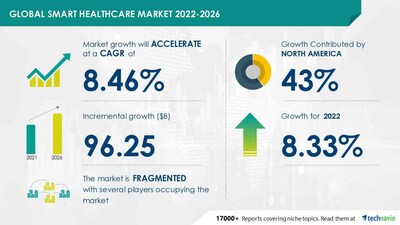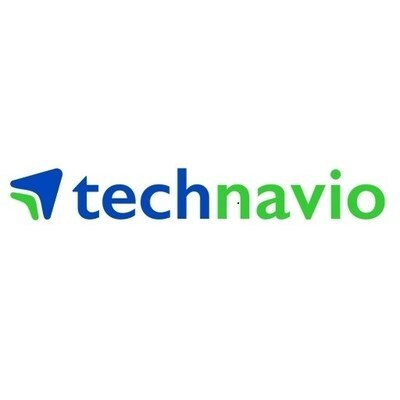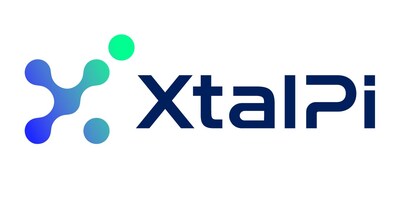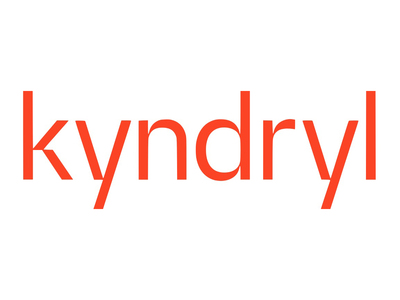Smart Healthcare Market size is set to grow by USD 115.39 billion from 2023-2027, Growing demand for remote health monitoring to boost the market growth, Technavio
Press Releases
Jul 18, 2024
NEW YORK, July 18, 2024 /PRNewswire/ — The global smart healthcare market size is estimated to grow by USD 115.39 billion from 2023-2027, according to Technavio. The market is estimated to grow at a CAGR of 9.26% during the forecast period. Growing demand for remote health monitoring is driving market growth, with a trend towards iot in healthcare. However, high costs involved with smart healthcare poses a challenge. Key market players include Abbott Laboratories, Alphabet Inc., Altera Digital Health Inc, Apple Inc., AT and T Inc., athenahealth Inc., Cisco Systems Inc., F. Hoffmann La Roche Ltd., General Electric Co., Hewlett Packard Enterprise Co., Honeywell International Inc., International Business Machines Corp., Johnson and Johnson Services Inc., Koninklijke Philips N.V., Medtronic Plc, Microsoft Corp., Olympus Corp., Samsung Electronics Co. Ltd., Zebra Technologies Corp., and Oracle Corp..
Get a detailed analysis on regions, market segments, customer landscape, and companies – Click for the snapshot of this report
|
Forecast period |
2023-2027 |
|
Base Year |
2022 |
|
Historic Data |
2017 – 2021 |
|
Segment Covered |
Distribution Channel (Offline and Online ), Solution (Telemedicine, mHealth, EHR, Smart pills, and Others ), and Geography (North America, Europe, Asia, and Rest of World (ROW)) |
|
Region Covered |
Europe, North America, Asia, and Rest of World (ROW) |
|
Key companies profiled |
Abbott Laboratories, Alphabet Inc., Altera Digital Health Inc, Apple Inc., AT and T Inc., athenahealth Inc., Cisco Systems Inc., F. Hoffmann La Roche Ltd., General Electric Co., Hewlett Packard Enterprise Co., Honeywell International Inc., International Business Machines Corp., Johnson and Johnson Services Inc., Koninklijke Philips N.V., Medtronic Plc, Microsoft Corp., Olympus Corp., Samsung Electronics Co. Ltd., Zebra Technologies Corp., and Oracle Corp. |
Key Market Trends Fueling Growth
The healthcare industry is experiencing a significant shift towards smart healthcare solutions, driven by the increasing use of IoT and connected medical devices. IoT infrastructure is bridging the gap between physical and digital data sources, enabling real-time patient monitoring and improving access to healthcare services. This trend is transforming healthcare institutions into connected hospitals, with applications ranging from telemedicine and connected imaging to clinical workflow management and inpatient monitoring. The adoption of IoT is being fueled by government initiatives, the need to reduce healthcare costs, and the growing penetration of smartphones and the Internet. As the number of connected devices increases, security becomes a top priority, leading to the widespread adoption of Electronic Health Records (EHRs) to optimally collect and integrate data. Vendors offering cloud-based solutions, such as Cisco, Microsoft, and Alphabet, are seizing lucrative growth opportunities in the smart healthcare market. The demand for connected systems to enhance healthcare deployments is expected to drive the growth of the global smart healthcare market.
Smart healthcare is a rapidly growing market that integrates digital technology into healthcare items, such as pedometers and activity trackers, to monitor and manage health data. This includes smart wearables like smart syringes and smart medicines, which provide real-time information on usage. Remote monitoring through mobile health and telemedicine is also a significant trend, enabling real-time tracking of vital signs like blood pressure, heart rate, oxygen level, and temperature. Market leaders like Vera Smart Health and Teladoc Health are utilizing RFID technology in smart healthcare products for efficient inventory management through RFID Kanban Systems and RFID Smart Cabinets. Electronic Health Records and information technologies like big data, cloud computing, artificial intelligence, and real-time location systems are revolutionizing the traditional medical system. However, market restraints include privacy concerns and the need for standardization. Despite these challenges, the future of smart healthcare is bright, with continuous innovation and advancements in digital technology.
Discover 360° analysis of this market. For complete information, schedule your consultation- Book Here!
Market Challenges
- The high cost is a major barrier to the adoption of smart healthcare solutions, particularly in the case of emerging technologies like biosensors. The significant expense of biosensors, which include the cost of sensors, pills, fluidic sensors, flow meters, gyroscopes, and micro dispensers, limits their application in new areas. Similarly, the integration of Electronic Health Records (EHR) comes with substantial costs. The implementation costs consist of the preliminary fixed cost, licensing fees, maintenance expenses, and the opportunity costs of time spent on learning to use the new system. Hospitals, which typically have a low IT budget, find it challenging to implement EHR fully or partially due to these costs. The time taken for EHR implementation also increases with the level of integration required, leading to further expense. Consequently, the high costs associated with certain smart healthcare solutions hinder their adoption, negatively impacting the growth of the global smart healthcare market.
- The Smart Healthcare Market is experiencing significant growth due to the increasing demand for advanced healthcare solutions. However, challenges persist, such as obtaining necessary approvals for new technologies, addressing cognitive impairment in elderly patients, and ensuring seamless integration of wearable devices with cloud communication. Caregivers, patients, families, physicians, hospitals, and insurance companies all benefit from these innovations, but high costs remain a concern. Oral Biology and Craniofacial Research, along with medical record-keeping, are also adopting digital health solutions. Illness causes are being monitored using sensor-based IoT technology, enabling early intervention for conditions like asthma and diabetes. Surgery, eHealth, and digital health programs are revolutionizing healthcare services and research. Key market participants include cell phones, tablets, and patient monitoring devices, all contributing to improved health outcomes. Infrastructure and digital literacy are essential for the successful implementation of connected healthcare, with the internet and health-related apps playing crucial roles. Smart wearable devices, such as smartwatches and health monitors, are gaining popularity, offering advantages like acoustic resonance for lung function assessment and essential cardiology monitoring using blood glucose monitors.
For more insights on driver and challenges – Download a Sample Report
Segment Overview
This smart healthcare market report extensively covers market segmentation by
- Distribution Channel
- 1.1 Offline
- 1.2 Online
- Solution
- 2.1 Telemedicine
- 2.2 mHealth
- 2.3 EHR
- 2.4 Smart pills
- 2.5 Others
- Geography
- 3.1 North America
- 3.2 Europe
- 3.3 Asia
- 3.4 Rest of World (ROW)
1.1 Offline- The offline segment of the global smart healthcare market refers to the traditional distribution channels for smart healthcare products and services. Retail stores, medical equipment suppliers, and distributors are key players in this sector. These channels offer customers the opportunity to physically examine and purchase smart healthcare devices, such as fitness trackers, smartwatches, blood pressure monitors, and advanced medical equipment. Medical equipment suppliers and distributors have established relationships with healthcare providers, hospitals, clinics, and pharmacies, enabling the distribution of telehealth systems, remote patient monitoring equipment, and other smart healthcare solutions. The personalized customer experience provided by offline channels enhances customer satisfaction and builds trust. Many consumers prefer these established distribution channels due to their reliability, professional expertise, and after-sales support. These factors are expected to fuel the growth of the offline segment of the global smart healthcare market.
For more information on market segmentation with geographical analysis including forecast (2023-2027) and historic data (2017 – 2021) – Download a Sample Report
Learn and explore more about Technavio’s in-depth research reports
The global Equine Healthcare Market is expanding due to increased awareness of animal health and advanced treatment options. Major players focus on innovations in diagnostics, therapeutics, and surgical procedures. The global Medical Devices Market is experiencing robust growth, driven by technological advancements and rising demand for minimally invasive procedures. Key areas include imaging, diagnostics, and wearable devices. The global Medical Terminology Software Market is growing rapidly, propelled by the need for standardized communication in healthcare settings. This software enhances efficiency, accuracy, and compliance in medical documentation and coding.
Research Analysis
The Smart Healthcare Market is experiencing rapid growth due to the integration of mHealth and information technologies. Vera Smart Health and Teladoc Health are leading the charge in this space, offering remote monitoring solutions for various health metrics such as blood pressure, heart rate, oxygen level, and temperature. These smart healthcare products leverage digital technology, including RFID and Real-Time Location Systems, to ensure accurate tracking and monitoring. Apple is also making waves with its smart wearables, which allow users to monitor their health and connect with healthcare professionals. Big data and cloud computing are essential components of this market, enabling healthcare providers to access and analyze patient data in real-time. Smart healthcare items include not only wearables but also smart syringes, medicines, and RFID cabinets, all designed to improve patient care and outcomes. Overall, the Smart Healthcare Market is revolutionizing the way we approach healthcare, making it more accessible, efficient, and personalized.
Market Research Overview
Smart Healthcare Market: Transforming Healthcare with mHealth and Information Technologies The Smart Healthcare Market is revolutionizing traditional healthcare systems by integrating mHealth, RFID, Real-Time Location Systems, and advanced information technologies like big data, cloud computing, and artificial intelligence. These technologies enable remote patient monitoring of vital signs such as blood pressure, heart rate, oxygen level, and temperature using smart healthcare products like wearable devices, smartwatches, health monitors, pedometers, and activity trackers. The advantages of Smart Healthcare are numerous, including improved health outcomes, enhanced patient engagement, and more efficient healthcare services. However, high costs and infrastructure requirements pose market restraints. Digital health programs, eHealth, and health research are key areas of growth, with cell phones and tablets becoming essential patient monitoring devices. Cognitive impairment, Oral Biology, Craniofacial Research, and medical record-keeping are also benefiting from sensor-based IoT technology and digital health infrastructure. Smart syringes, medicines, RFID cabinets, and smart pills are transforming healthcare delivery, while telemedicine and remote monitoring enable caregivers, patients, families, physicians, hospitals, and insurance companies to stay connected. Market participants include healthcare services, digital health companies, and infrastructure providers, with key market restraints being RFID Kanban Systems, RFID Smart Cabinets, Electronic Health Records, and Telemedicine. The future of Smart Healthcare lies in the integration of acoustic resonance, lung function, asthma, essential cardiology, and health-related apps, enabling personalized and proactive healthcare.
Table of Contents:
1 Executive Summary
2 Market Landscape
3 Market Sizing
4 Historic Market Size
5 Five Forces Analysis
6 Market Segmentation
- Distribution Channel
- Offline
- Online
- Solution
- Telemedicine
- MHealth
- EHR
- Smart Pills
- Others
- Geography
- North America
- Europe
- Asia
- Rest Of World (ROW)
7 Customer Landscape
8 Geographic Landscape
9 Drivers, Challenges, and Trends
10 Company Landscape
11 Company Analysis
12 Appendix
About Technavio
Technavio is a leading global technology research and advisory company. Their research and analysis focuses on emerging market trends and provides actionable insights to help businesses identify market opportunities and develop effective strategies to optimize their market positions.
With over 500 specialized analysts, Technavio’s report library consists of more than 17,000 reports and counting, covering 800 technologies, spanning across 50 countries. Their client base consists of enterprises of all sizes, including more than 100 Fortune 500 companies. This growing client base relies on Technavio’s comprehensive coverage, extensive research, and actionable market insights to identify opportunities in existing and potential markets and assess their competitive positions within changing market scenarios.
Contacts
Technavio Research
Jesse Maida
Media & Marketing Executive
US: +1 844 364 1100
UK: +44 203 893 3200
Email: [email protected]
Website: www.technavio.com/
![]() View original content to download multimedia:https://www.prnewswire.com/news-releases/smart-healthcare-market-size-is-set-to-grow-by-usd-115-39-billion-from-2023-2027–growing-demand-for-remote-health-monitoring-to-boost-the-market-growth-technavio-302199100.html
View original content to download multimedia:https://www.prnewswire.com/news-releases/smart-healthcare-market-size-is-set-to-grow-by-usd-115-39-billion-from-2023-2027–growing-demand-for-remote-health-monitoring-to-boost-the-market-growth-technavio-302199100.html
SOURCE Technavio





